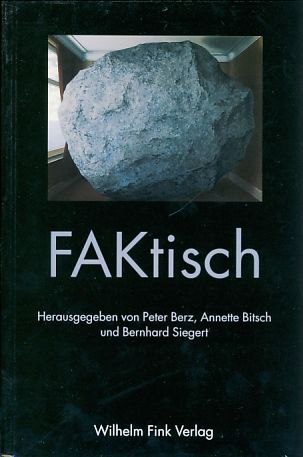Berz; Bitsch; Siegert (eds.): FAKtisch. Festschrift für Friedrich Kittler zum 60. Geburtstag (2003) [German]
Filed under book | Tags: · computing, history, literature, mathematics, media archeology, media history, media theory, psychoanalysis

“Dieser Band würdigt das facettenreiche Werk Friedrich Kittlers, das sich von der Literaturwissenschaft über die Mediengeschichte und die Computerwissenschaft bis hin zur Mathematik, Kulturwissenschaft und Gräzistik erstreckt. Die Beiträge lassen die immense Vielfalt der Disziplinen und Gegenstände erkennen, die durch Kittlers Arbeiten Anregungen erhalten haben und nicht selten geradezu revolutioniert worden sind.”
Edited by Peter Berz, Annette Bitsch, Bernhard Siegert
Publisher Wilhelm Fink, Munich, 2003
ISBN 3770539168, 9783770539161
374 pages
PDF (no OCR, updated on 2012-12-31)
Comments (3)Quentin Meillassoux: The Number and The Siren: A Decipherment of Mallarmé’s Coup de dés (2011/2012) [French, English]
Filed under book | Tags: · contingency, literary criticism, literature, mathematics, philosophy, poetics, poetry

“A meticulous literary study, a detective story à la Edgar Allan Poe, a treasure-hunt worthy of an adventure novel – such is the register in which can be deciphered the hidden secrets of a poem like no other. Quentin Meillassoux, author of After Finitude, continues his philosophical interrogation of the concepts of chance, contingency, infinity and eternity through a concentrated study of Mallarmé’s poem Un Coup de dés, patiently deciphering its enigmatic meaning on the basis of a dazzlingly simple and lucid insight with regard to that ‘unique Number that cannot be another’.
Un Coup de Dés jamais n’abolira le Hasard constitutes perhaps the most radical break in the history of modern poetry: the fractured lines spanning the double page, the typographical play borrowed from the poster form, the multiplication of interpolations disrupting reading. But the intrigue of this poem is still stranger, always resistant to full elucidation. We encounter a shipwreck, and a Master, himself almost submerged, who clasps in his hand the dice that, confronted by the furious waves, he hesitates to throw. The hero expects this throw, if it takes place, to be extraordinarily important: a Number said to be ‘unique’ and which ‘can be no other’.
The decisive point of the investigation proposed by Meillassoux comes with a discovery, unsettling and yet as simple as a child’s game. All the dimensions of the Number, understood progressively, articulate between them but one sole condition: that this Number should ultimately be delivered to us by a secret code, hidden in the Coup de dés like a key that finally unlocks every one of its poetic devices. Thus is also unveiled the meaning of that siren, emerging for a lightning-flash amongst the debris of the shipwreck: as the living heart of a drama that is still unfolding.
The English volume contains the entire text of the Coup de dés and three other poems, with new translations.”
Le nombre et la sirène. Un déchiffrage du Coup de dés de Mallarmé
Publisher Fayard, 2011
ISBN 2213666989, 9782213666983
256 pages
English edition
Translated by Robin Mackay
Publisher Urbanomic, Falmouth, and Sequence Press, New York, 2012
ISBN 9780983216926
306 pages
Review (Michael Reid, Mute)
Review (Adam Kotsko, The New Inquiry)
Review (Thomas H. Ford, Canadian Society for Continental Philosophy)
Review (Edward K. Kaplan, Nineteenth-Century French Studies)
Review (Brian Kim Stefans, Los Angeles Review of Books)
Graham Harman’s blog post about the book, part 2
PDF, PDF (French, updated on 2015-1-24)
PDF, PDF (English, updated on 2015-1-24)
Christos H. Papadimitriou: Turing: A Novel About Computation (2003)
Filed under fiction | Tags: · algorithm, computing, history of computing, history of technology, machine, mathematics, technology, turing machine

Our hero is Turing, an interactive tutoring program and namesake (or virtual emanation?) of Alan Turing, World War II code breaker and father of computer science. In this unusual novel, Turing’s idiosyncratic version of intellectual history from a computational point of view unfolds in tandem with the story of a love affair involving Ethel, a successful computer executive, Alexandros, a melancholy archaeologist, and Ian, a charismatic hacker. After Ethel (who shares her first name with Alan Turing’s mother) abandons Alexandros following a sundrenched idyll on Corfu, Turing appears on Alexandros’s computer screen to unfurl a tutorial on the history of ideas. He begins with the philosopher-mathematicians of ancient Greece—”discourse, dialogue, argument, proof… can only thrive in an egalitarian society”—and the Arab scholar in ninth-century Baghdad who invented algorithms; he moves on to many other topics, including cryptography and artificial intelligence, even economics and developmental biology. (These lessons are later critiqued amusingly and developed further in postings by a fictional newsgroup in the book’s afterword.) As Turing’s lectures progress, the lives of Alexandros, Ethel, and Ian converge in dramatic fashion, and the story takes us from Corfu to Hong Kong, from Athens to San Francisco—and of course to the Internet, the disruptive technological and social force that emerges as the main locale and protagonist of the novel.
Alternately pedagogical and romantic, Turing (A Novel about Computation) should appeal both to students and professionals who want a clear and entertaining account of the development of computation and to the general reader who enjoys novels of ideas.
Publisher MIT Press, 2003
Computer Science series
ISBN 0262661918, 9780262661911
284 pages
PDF (updated on 2012-7-25)
Comment (1)
